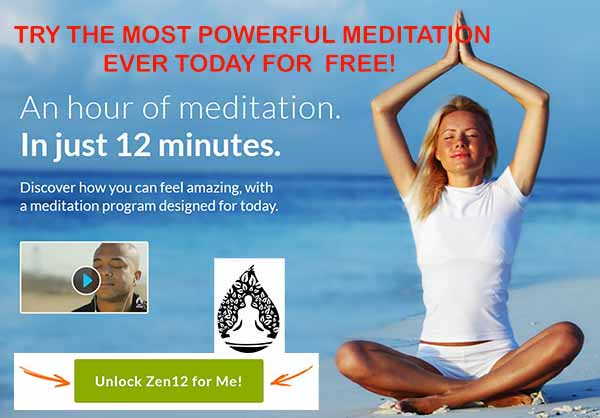With meditation, it helps if we can understand that there is no single or correct way that is best for everyone to follow. Therefore, “should I meditate with eyes open or closed” is a question that you will get many different opinions about.
However, it is a relevant question because up to 80 % of our sensory information comes to us through our vision. Therefore, what we do with our eyes is going to have a big effect on what is happening within our brains at any given moment.
For many in the West, meditating with open eyes is not very common, and yet it is the normal way of practicing in many older Eastern traditions.
So, let’s look at how the two different techniques compare in terms of methods of practice and benefits received to see if you can figure out which way may be best for you.
Should I Meditate With Eyes Open Or Closed?
The best way for you to meditate is the way that gets you the results you want. Thoughts about sitting or standing, morning or evening, eyes opened or closed, all add up to the one thing…. How can I achieve the maximum benefit from my practice? To know the answers, we need to have defined goals. And some of our goals are easier to achieve with our eyes open while others come easier when we meditate with our eyes closed.
Does Meditating With Our Eyes Opened or Closed Change the Outcome of Our Meditation?
From my 25-plus years of experience with meditation, I have found that it is the reasons why we meditate in the first place that determine which method we should begin with.
I say ‘begin with’ because as you progress through the years with meditation, you will naturally want to experiment with different options and techniques to experience the different benefits they bring.
And further down the road, when you are able to easily slip into a meditative state at will, you will find that it’s irrelevant whether your eyes are opened or closed.
However, for now, it’s important to know that you can achieve your goals, either for relaxation or ‘enlightenment’ with either method…… after you have achieved the basics of ‘good practice.’ The rest is just time……
To show this, the Zen Buddhist and Tibetan traditions typically teach meditation with eyes open while Indian traditions teach meditation mostly with our eyes closed…. And yet there are enlightened masters from all traditions.
So, the eyes being open or closed is not the main factor determining the outcome. How often we can reach a meditative state, and the depth of our meditation is far more important.
Meditate With Eyes Opened or Closed? Each Method Has Advantages and Disadvantages
The style you will want to practice comes down to what you are trying to achieve, and your personal preferences. Neither is ‘better’ than the other….. however, they do produce different results.
The Main Advantages of Meditating with Eyes Open (or half-opened) include:
 – It is easier to remain awake
– It is easier to remain awake
– If we are focusing on an object, we will develop an improved ability to concentration
– We can practice when we are on the subway, in a café, or even while at our desks at work
– Since we live life with our eyes open, if we practice this method, it becomes easier to incorporate meditation into our ‘normal’ lives
The Main Disadvantages of Meditating with Eyes Open (or half-opened) include:
– Until we are experienced meditators, there is more to distract us because our visual senses are active
– Depending on the conditions where we are meditating, our eyes may become dry or they may even become watery
– Our eyelids will probably feel heavy and may become a distraction
The Main Advantages of Meditating with Eyes Closed include:
– It’s easier to focus on bodily sensations, the breath, and chakra awareness
– It’s easier to relax the mind, and the best method for practicing thought awareness
– Best for practicing visualizations and developing imagination
– It’s easier to become grounded and relaxed more quickly
– Many people, myself included, find that you can reach a deeper state of awareness of self…. There is a vast empty space I get to that I do not reach when I meditate with my eyes open.
– I sometimes use my meditations to focus on my third eye but only when my eyes are closed
The Main Disadvantages of Meditating with Eyes Closed Include:
– Closing of the eyes leads some people to fall asleep
– Some people don’t feel safe closing their eyes and ‘being with themselves,’ or with a group of strangers
How Do We Meditate With These Different Options?
– Meditating with our eyes closed is pretty self-explanatory.
We just get into a relaxed position and close our eyes. And from there we have a few options.
We can either practice awareness of our thoughts or feelings or focus our eyes upwards to stimulate our third eye. In all cases, our breath should be relaxed and left to find its rhythm naturally, (unless we are practicing specific breathing techniques.)
– Meditating with our eyes open is a different story as we have some different options to consider.
 – Most formal techniques teach that your eyes should be between 50 and 20 % opened softly, and your gaze should be ‘soft’ and relaxed.
– Most formal techniques teach that your eyes should be between 50 and 20 % opened softly, and your gaze should be ‘soft’ and relaxed.
If sitting, sit upright and have your gaze downward at about a 45-degree angle so you are staring at the floor between one to two meters in front of you.
This will help limit visual distractions and minimize eye fatigue. If it helps, you can remove all obstacles from your line of vision and stare into a blank wall, or darken the room to remain focused.
– Focusing your attention on a single point in space, or on the wall is also good. Just remember to keep your eyes ‘soft,’ almost resting.
– Walking meditation should be done with eyes open for the obvious reason that you don’t want to walk into anything.
– Trataka is a specific Hindu and Yogic meditation for developing concentration. It involves gazing intently at an object, like a candle flame to awaken the third eye.
However, the benefits are gained, not because of the object gazed upon, but because of the developing ability to concentrate.
The objective is to keep your eyes open. Your eyes will normally produce tears, and you will have to blink. This is normal, and after blinking, just begin again, and again…….
Then, close your eyes, and try to visualize, or ‘see’ the candle flame in your mind’s eye. And repeat! This will absolutely develop your ability to visualize and concentrate.
Final Thoughts
Many people make the mistake of trying to work out ‘the best way to meditate’ with their logical minds. And our rational left brain is never going to be able to give us the complete answer. It’s like trying to know what skydiving feels like from reading a book….. not very useful at all!
 So, you need to go and do it for yourself.
So, you need to go and do it for yourself.
Try different things until you find ways that resonate with you…. And then stick with them for a while, at least until you become competent enough to have ‘a good session’ most times you practice.
Then, if you want, start experimenting with different things. You may want to include some music or change the style of music, try new locations and new postures, or add objects to focus on.
The length of your sessions and the number of times you meditate are also something you can adjust to help you reach your meditation goals.
And yes, of course, you can learn to meditate with your eyes open or closed… because, at the end of the day, it doesn’t really matter!
Instead of wasting time and stressing over trying to figure these things out, just do it….. meditate often, and you will find YOUR WAY……..





Hi Andrew and thank you for elaborating on this topic.
I need to make a confession here: I have not meditated once. I read about all the benefits it has and how important it is for a healthy mind. Yet, I just never got to it.
However based on your post, meditation is a different experience for everybody and each of us prefers to practice it differently, eg. with our eyes open or closed. I can associate this with ASMR. The idea there is the same: you either love it or you hate it 🙂 Basically, you either find a way that helps you relax your mind and enjoy the moment (as meditation and ASMR do) or you just do not find the added value for you in any of them and you quit both.
Best of luck,
Tatiana
Hi Tatiana,
I had to look up ASMR (Autonomous Sensory Meridian Response) as I have never heard of it before…. interesting!
Anything that can promote mental, emotional, and physical well-being in us is to be encouraged. However, I believe meditation is still the number one best option. I say this because meditation is a practice where we learn to promote well-being from within ourselves. Other things, like ASMR, rely on external stimuli to make us feel better…
The issue with relying on stuff outside of us for our well-being is that it can be taken away, changed, or just not available. Then we are left with ourselves again and need to search for something else to positively stimulate us.
Meditating is a process of going within to find inner peace and happiness with ourselves and our lives… and once we have that, it can never be taken away from us.
I wish you well on your journey,
Andrew
Hi Andrew,
Thanks for sharing such an informative post. To be honest I never really thought about meditation any other way than having our eyes closed. I know there is walking meditation and obviously doing that with closed eyes would take very heightened senses to really work. Although from reading this post what is apparent to me is that meditation without closing the eyes can work and is done by many spiritual leaders. (I didn’t actually know this.)
Only they say walking near water in places such as the riverside, by lakes, and along the beach is thought to trigger a kind of awakened meditative state. I guess maybe any natural place such as a meadow, or forest could work similarly.
I think that perhaps because actual reality and what’s beneath its layers is on so many levels it must just be a case of unlocking it all. So maybe having your eyes open is just kind of a formality – apparently, some people sleep with one eye open so maybe that is something relevant to all this.
Look forward to reading more soon.
Best regards;
Alex
Hi Alex,
I didn’t know that some people sleep with one eye open!
In this wonderful world, I guess all things are possible 🙂 And yes, there are layers upon layers, upon layers… I believe that while we are alive we will never have all the answers, but we can keep accumulating another and another piece to the puzzle.
And that’s what makes life interesting for me. We get to constantly learn and do new things if we want, and they all add something extra to the big picture.
Keep learning mate, and keep enjoying.
Thanks for sharing,
Andrew
I never thought about whether to meditate with my eyes closed or open. Therefore, it was very interesting to read this article and all the pros and cons regarding these two options.
I meditate with my eyes closed. And preferably in a supine position, although they mostly recommend sitting meditation. It has never occurred to me to fall asleep while meditating in the morning or during the day, but it has already happened to me that I fell asleep while meditating in the evening.
I agree with you, we are all individuals, and everyone has to explore for themselves what suits them best.
All the best,
Nina
Hi Nina,
If you have a practice and it’s working for you, don’t change it! that is unless you want to explore something different. because they do produce different results on our systems, mentally, emotionally, and physically.
The differences may be subtle or they may be profound for you. but, as I say, if things are going well for you, there’s no need to change.
however, one day, an idea may pop into your head to try a new method of meditation…. listen to your intuition, and you will know what it needs and therefore what is best for you 🙂
Have a great day 😉
Andrew
Like you said, open or close, it doesn’t matter- it’s entirely up to personal preference.
I personally find that if my eyes are closed, I tend to drift off more easily, so for me, it’s better to meditate with my eyes open. This way, it is easier for me to stay focused and alert and it will help me maintain a sense of mindfulness throughout the day. I think it’s also great in helping you learn to keep your mind focused even when outside stimuli such as visual distractions are present.
On the other hand, closing your eyes during meditation can help you relax more deeply and connect with your inner thoughts and feelings more easily.
Ultimately, it’s what works best for you and not investing in irrelevance. Thank you for this.
Femi.
Hi Femi.
I also use both methods depending on the results I want to achieve at the time.
However, I don’t recommend that beginner meditators switch between open and closed until they have become proficient in each method by having consistently practiced one method for a sustained period of time.
I agree that when we meditate with our eyes open, we can teach ourselves how to better remain focused when there are visual distractions happening around us. And we do this simply by continually returning our attention to the object of our focus.
Thanks for sharing, mate.
I wish you a fantastic day,
Andrew